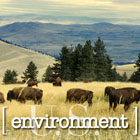
|
|||||||||||||||||
First Amendment to the US Constitution:
|
BUSH ADMIN. HAS LOOSENED RESTRICTIONS ON FILLING WETLANDS, EVEN DELICATE OR ENDANGERED HABITAT, TO ALLOW BUILDERS TO EXPLOIT CURRENT PRESERVES 7 July 2007 In June 2006, the Supreme Court issued a ruling requiring that previously unprotected small or unmapped streams and waterways be brought under the 1972 Federal Clean Water Act. Isolated wetlands were to fall under this ruling, and the US government drafted a policy proposal that would regulate the development or filling of such wetlands. Now, new language added to the rules, seem to leave isolated wetlands without federal oversight. Property developers, mine owners and farmers, put forth an intensive lobbying effort, arguing that the regulations were designed to protect continuous waterways that fed into bodies of water related to public health concerns, that isolated wetlands should be left unregulated. The Supreme Court had found that there was sufficient science to illustrate how all bodies of water are interconnected through runoff, rain patterns and the broader biological fabric of ecosystems. In this way, even small, isolated wetlands play an integral role in the overall quality of waterways and lakes and ponds, drinkin-water sources and irrigation water. Three and a half decades of jurisprudence have led Clean Water Act regulations down two distinct but intertwined trains of thought: one based on restricting pollution to protect public health specifically, the other based on restricting pollution and building in order to serve the environmental interest of habitat, species and ecosystem conservation. The lobbying effort against regulating wetland conservation argued that wetlands were less integrated than open water into the overall health of surrounding ecosystems and that it was more the specific species living in isolated ecosystems and not the broad human population, that might run some risk. By extension, small, isolated wetlands without endangered species, were not in need of such intensive federal scrutiny. The rules change hinges on subtle changes in wording between a new policy proposal issued in September and a revised version issued in June. Under the new wording, bodies of water that are not demonstrably "navigable", or in other words, are not visibly connected at the surface to larger watersheds, do not, in the government's interpretation, fall under EPA or Army Corps of Engineers jurisdiction for issuing or refusing permits. If environmental groups successfully demonstrate that in specific cases, an apparently isolated water source forms part of a broader watershed, this information could override the "navigable" requirement. But environmental advocates were unified in denouncing the rules change as leaving a large number of fragile habitats unprotected from development or pollution. [s]
BACKGROUND: In a lawsuit brought by 12 states, several cities and a dozen pro-environment organizations against the federal government, the US Supreme Court has handed down a narrow 5 to 4 ruling reversing Bush administration policy that avoids regulating carbon dioxide emissions. The Court says the Clean Air Act specifically authorizes the EPA to enforce such regulation in order to protect the public and effect clean air standards. [Full Story] FEDERAL JUDGE STRIKES DOWN BUSH POLICY LOOSENING CONTROLS ON PESTICIDE USE U.S. District Judge John C. Coughenour has struck down a Bush administration policy loosening regulation of toxic pesticides. He found the rule change "striking in its total lack of any evidence of technical or scientific support for the policy positions ultimately adopted" and further chastised the government for failing to properly apply the Endangered Species Act. [Full Story] BILL PRESENTED TO PREVENT GOV'T TAMPERING WITH SCIENCE Rep. Brad Miller (D-NC) is to introduce an amendment to legislation currently under debate, which would restrict the executive branch's ability to gag scientists, manipulate their findings or demote those who disagree with official policy. The legislation would also require that scientists appointed to investigatory panels be selected for their credentials, not their political views. [Full Story] SCIENCE ABOVE TECHNOCRACY, FOR A FULLER FUTURE Science is in many ways an artform, but it is specifically and most importantly, the art of knowledge. It is not philosophy, not a study of how knowledge comes about, what it is, whether it can be trusted or whether we need to adjust our thinking; it is, instead, a direct study of the natural world, its tendencies, its evidence, and its capacity to work with us, for us and around us. [Full Story] GOV'T POLICY UNLAWFULLY CRIMINALIZES COMMENT ON SCIENTIFIC FACT The global environment is, of course, a global issue, one that touches every life on the planet, and the science about it should be open and available to all. Past government policy and existing federal law mean that such scientific evidence should be readily available to the public. But now, it appears that several agencies are laboring to silence scientists who are researching climate trends and alterations. [Full Story] POPULATION, LAND, AND CONFLICT As land and water become scarce and as competition for these vital resources intensifies, we can expect mounting social tensions within societies, particularly between those who are poor and dispossessed and those who are wealthy, as well as among ethnic and religious groups. Population growth brings with it a steady shrinkage of life-supporting resources per person. [Full Story] |
||||||||||||||||
|
|||||||||||||||||









